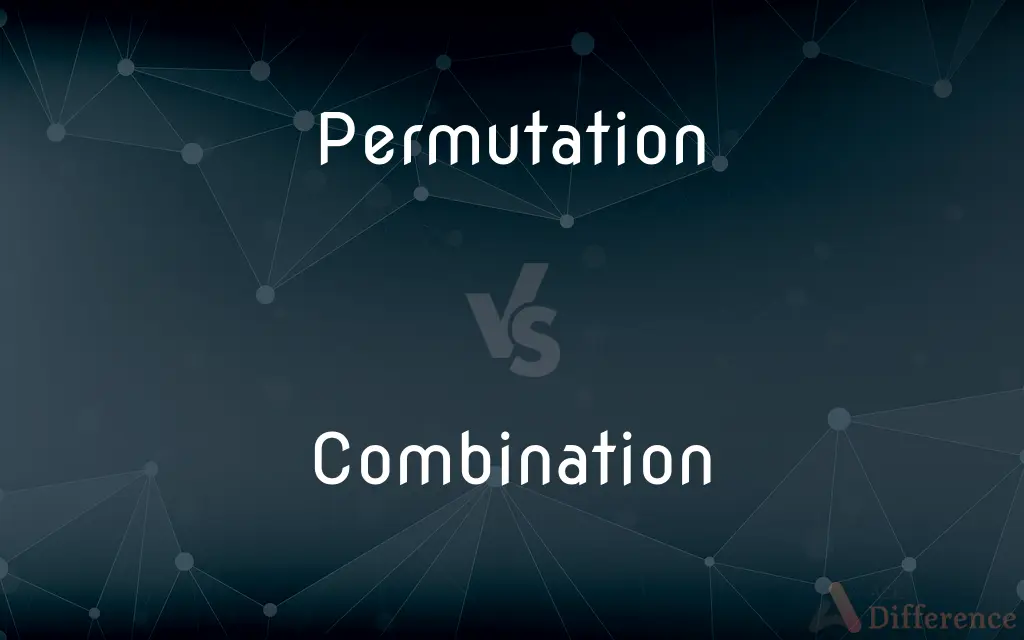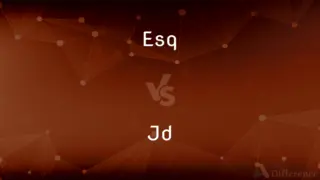Permutation vs. Combination — What's the Difference?
By Urooj Arif & Fiza Rafique — Updated on March 21, 2024
Permutation focuses on the arrangement of elements, where order matters; combination deals with selection, where order is irrelevant.

Difference Between Permutation and Combination
Table of Contents
ADVERTISEMENT
Key Differences
Permutations involve arranging items where the order matters, highlighting the sequence in which elements are placed. For instance, the arrangement of letters to form words takes into account the order, making "CAT" different from "ACT". On the other hand, combinations are about selecting items where the order doesn't matter, emphasizing the selection of groups or sets without considering the sequence. Choosing 3 fruits from a basket to make a fruit salad doesn't concern itself with the order of selection; apple, banana, and cherry is the same combination as cherry, apple, and banana.
In permutations, each distinct arrangement is unique, making the number of permutations generally higher for the same set of elements compared to combinations. For example, the permutations of three colors red, green, and blue (RGB, GBR, BRG, etc.) are more numerous than the combinations, which only count the unique sets without regard to order (RGB is the same as BRG). Whereas, in combinations, the focus is on the variety of groups formed, where the same set of elements leads to fewer combinations since order is disregarded.
Permutations often involve more complex calculations when compared to combinations, especially in cases involving restrictions or specific conditions, like not allowing certain elements to be in specific positions. For example, calculating the number of ways to arrange books on a shelf where two particular books must not be next to each other involves more intricate permutation calculations. Combinations, however, simplify the process by not considering such positional constraints, focusing solely on the selection of items regardless of their order on the shelf.
The concept of permutations extends to various fields, including cryptography, where the arrangement of elements is crucial for encryption algorithms and creating secure passwords. The precise order of characters in a password makes permutations essential for generating a wide range of possibilities, enhancing security. Combinations, conversely, find their relevance in scenarios like lottery games or selecting teams, where the combination of numbers or members is key, and the sequence in which they are drawn or listed is irrelevant.
Understanding permutations and combinations is fundamental in probability theory, where permutations help calculate the likelihood of ordered events, and combinations are used to determine the probability of selecting specific groups or sets. This distinction is crucial for accurately assessing the chances of outcomes in various scenarios, from card games to data analysis.
ADVERTISEMENT
Comparison Chart
Definition
Arrangement of items where order matters.
Selection of items without regard to order.
Importance
Order of elements is crucial.
Order of elements is irrelevant.
Calculations
Generally involves more complex calculations.
Simpler calculations.
Application Fields
Cryptography, password generation, ordered events.
Lottery, team selection, group selections.
Example
The word "STOP" can be arranged as "POTS", "SPOT", etc.
Choosing 2 fruits from {apple, banana, cherry}.
Compare with Definitions
Permutation
The arrangement of elements in a specific order.
The permutation of the word LOG can result in GOL, OLG, or LGO.
Combination
The selection of items where the order does not matter.
A combination of fruits for a salad might include apple, banana, and cherry.
Permutation
Used in scenarios where sequence is key.
In a race, the permutation of finishers determines the winners.
Combination
Used when the focus is on group selection, not the arrangement.
Selecting team members for a project involves combinations.
Permutation
Involves all possible orderings of a set.
Permutations of ABC are ABC, ACB, BAC, BCA, CAB, CBA.
Combination
Concerns the unique sets that can be formed from elements.
Combinations of ABC taken 2 at a time are AB, AC, and BC.
Permutation
Calculated using factorial notation for total arrangements.
The number of permutations of 4 items is 4! (4 factorial) = 24.
Combination
Calculated using binomial coefficients for group selections.
The number of 2-item combinations from 4 items is 6.
Permutation
Relevant in fields like cryptography and data organization.
Secure passwords rely on the permutations of characters for strength.
Combination
Applies to scenarios like team formations and lotteries.
Lottery winners are determined by the combination of numbers drawn.
Permutation
In mathematics, a permutation of a set is, loosely speaking, an arrangement of its members into a sequence or linear order, or if the set is already ordered, a rearrangement of its elements. The word "permutation" also refers to the act or process of changing the linear order of an ordered set.Permutations differ from combinations, which are selections of some members of a set regardless of order.
Combination
In mathematics, a combination is a selection of items from a collection, such that the order of selection does not matter (unlike permutations). For example, given three fruits, say an apple, an orange and a pear, there are three combinations of two that can be drawn from this set: an apple and a pear; an apple and an orange; or a pear and an orange.
Permutation
The process of altering the order of a given set of objects in a group.
Combination
The act of combining or the state of being combined.
Permutation
The result of such a process; a rearrangement or recombination of elements
Permutations of gene order.
Combination
The result of combining.
Permutation
(Mathematics) A rearrangement of the elements of a set.
Combination
An alliance of persons or parties for a common purpose; an association.
Permutation
A complete change; a transformation
The country's permutation into a modern democracy.
Combination
A sequence of numbers or letters used to open a combination lock.
Permutation
One of the ways something exists, or the ways a set of objects can be ordered.
Which permutation for completing our agenda items makes the most sense?
Combination
(Mathematics) One or more elements selected from a set without regard to the order of selection.
Permutation
(mathematics) A one-to-one mapping from a finite set to itself.
This permutation takes each element to the one following it, with the last mapped back to the first.
Combination
The act of combining, the state of being combined or the result of combining.
These guidelines should be followed in combination with those given last week.
She took a dangerous combination of alcohol and heroin.
Permutation
An ordering of a finite set of distinct elements.
There are six permutations of three elements, e.g. {abc, acb, bac, bca, cab, cba}.
Combination
An object formed by combining.
Permutation
(music) A transformation of a set's prime form, by applying one or more of certain operations, specifically, transposition, inversion, and retrograde.
Combination
A sequence of numbers or letters used to open a combination lock.
The combination to their safe was the date of birth of their first child.
Permutation
The act of permuting; exchange of the thing for another; mutual transference; interchange.
The violent convulsions and permutations that have been made in property.
Combination
(mathematics) One or more elements selected from a set without regard to the order of selection.
Permutation
Barter; exchange.
Combination
An association or alliance of people for some common purpose.
Permutation
The act of changing the arrangement of a given number of elements
Combination
(billiards) A combination shot; a billiard; a shot where the cue ball hits a ball that strikes another ball on the table.
Permutation
Complete change in character or condition;
The permutations...taking place in the physical world
Combination
A motorcycle and sidecar.
Permutation
Act of changing the lineal order of objects in a group
Combination
A rapid sequence of punches or strikes in boxing or other combat sports.
Combination
The act or process of combining or uniting persons and things.
Making new compounds by new combinations.
A solemn combination shall be madeOf our dear souls.
Combination
The result of combining or uniting; union of persons or things; esp. a union or alliance of persons or states to effect some purpose; - usually in a bad sense.
A combination of the most powerful men in Rome who had conspired my ruin.
Combination
The act or process of uniting by chemical affinity, by which substances unite with each other in definite proportions by weight to form distinct compounds.
Combination
The different arrangements of a number of objects, as letters, into groups.
Combination
A collection of things that have been combined; an assemblage of separate parts or qualities
Combination
A coordinated sequence of chess moves
Combination
A sequence of numbers or letters that opens a combination lock;
He forgot the combination to the safe
Combination
A group of people (often temporary) having a common purpose;
They were a winning combination
Combination
An alliance of people or corporations or countries for a special purpose (formerly to achieve some antisocial end but now for general political or economic purposes)
Combination
The act of arranging elements into specified groups without regard to order
Combination
The act of combining things to form a new whole
Common Curiosities
When are permutations used?
Permutations are used in scenarios where the arrangement and order of elements are crucial, such as in cryptography or organizing data.
When are combinations used?
Combinations are used when the selection of groups is important but the order of the selected items is not, such as in team selections or lotteries.
What is a combination?
A combination is a selection of items without regard to their order, focusing on the group as a whole.
How do permutations differ from combinations?
Permutations focus on the order of elements, while combinations focus on the selection of groups without considering order.
How is the number of permutations calculated?
The number of permutations is calculated using factorial notation, considering all possible orderings of a set.
Can the same set have more permutations than combinations?
Yes, a set typically has more permutations than combinations because permutations account for more arrangements by considering order.
How is the number of combinations calculated?
The number of combinations is calculated using binomial coefficients, focusing on the unique sets that can be formed.
Are permutations or combinations more complex to calculate?
Permutations can be more complex to calculate, especially with restrictions, whereas combinations usually involve simpler calculations.
What is a permutation?
A permutation is an arrangement of items in a specific order where the sequence is important.
How does the concept of 'order' influence permutations and combinations?
In permutations, the order significantly influences the arrangement and number of possibilities; in combinations, order is disregarded, focusing on the group selection.
Do permutations have real-world applications?
Yes, permutations have applications in fields like cryptography, data organization, and anywhere the order of elements is important.
Do combinations have real-world applications?
Yes, combinations are applied in scenarios like lottery games, team selections, and any situation where group selection matters without order.
Can an item be used more than once in permutations?
In certain types of permutations, an item can be used more than once, especially in permutations with repetition.
Can an item be used more than once in combinations?
In combinations, each item is typically considered unique and used once, but variations exist where repetition is allowed.
Why is understanding permutations and combinations important?
Understanding these concepts is crucial for accurately calculating probabilities, organizing data, securing information, and solving various mathematical and real-world problems.
Share Your Discovery

Previous Comparison
Lizard vs. Reptile
Next Comparison
Esq vs. JDAuthor Spotlight
Written by
Urooj ArifUrooj is a skilled content writer at Ask Difference, known for her exceptional ability to simplify complex topics into engaging and informative content. With a passion for research and a flair for clear, concise writing, she consistently delivers articles that resonate with our diverse audience.
Co-written by
Fiza RafiqueFiza Rafique is a skilled content writer at AskDifference.com, where she meticulously refines and enhances written pieces. Drawing from her vast editorial expertise, Fiza ensures clarity, accuracy, and precision in every article. Passionate about language, she continually seeks to elevate the quality of content for readers worldwide.














































